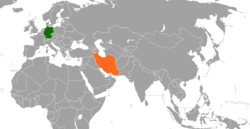German-Iranian relations

|
|
|
|
|
| Germany | Iran |
The German-Iranian relations describe the relationship between Germany and Iran . The Federal Republic of Germany has had an embassy in Tehran since 1955 , while Iran has an embassy in Berlin with consulates general in Hamburg , Frankfurt and Munich . The origins of the relationship go back to the 19th century.
Historical relationships
The unofficial relations between the German Reich and Iran go back to the early 19th century. Examples of cultural relationships are Goethe's dedication of his west-east divan to Hafez in 1819 or Georg Friedrich Grotefend's deciphering of the old Persian cuneiform .
In December 1859 Julius von Minutoli was sent to Persia for several years as the 1st Prussian Minister Resident and Consul General of the German Customs Union states. In 1873 the German-Persian friendship, trade and shipping treaty was concluded.
Diplomatic relations
Official diplomatic relations between Iran and Germany started again after World War II in 1952 when Iran opened its diplomatic mission office in Bonn .
Although the German government and the GDR had good relations with Iran, they supported Saddam Hussein several times in the First Gulf War by delivering chemical weapons to Iraq .
Current frequent points of contention between the German government and Iran are in particular human rights and Israel's right to exist . The then German Foreign Minister said: "A normal, friendly relationship with Germany will only be possible if Iran accepts Israel's right to exist ."
Nuclear deal
In July 2015, the five UN veto powers and Germany signed the treaty with Iran. He is preventing Iran from building an atomic bomb and enabling the Iranian nuclear program . According to the treaty, Iran was economically sanctioned until January 2016. At the beginning of May 2018, US President Donald Trump unilaterally terminated the contract.
trade
Germany is the third most important trading partner for Iran after China and Japan . Conversely, Iran is Germany's second most important trading partner in the Middle East after Israel .
Around 50 German companies have their own branches in Iran and more than 12,000 companies have their own sales representatives in Iran. Several well-known German companies are involved in major Iranian infrastructure projects, especially in the petrochemicals industry , such as Linde , BASF , Lurgi , Krupp , Siemens , ZF Friedrichshafen , Mercedes , Volkswagen and MAN .
In 2005, Germany had the largest share of the Iran export market with 1.67 billion US dollars (14.4%). In 2008, German exports to Iran increased by 8.9% and amounted to 84.7% of the total German-Iranian trade volume. The total bilateral trade volume up to the end of September 2008 was 3.23 billion euros compared to 2.98 billion euros in the previous year. The value of trade between Tehran and Berlin rose from around 4.3 billion euros in 2009 to just under 4.7 billion euros in 2010. According to German sources, around 80% of the machines and equipment in Iran are of German origin.
The German Chambers of Commerce and Industry estimated that economic sanctions against Iran cost more than 10,000 German jobs and could have a negative impact on Germany's economic growth. Sanctions would primarily affect medium-sized German companies that are heavily dependent on trade with Iran. There has been a shift in German business relations with Iran, from long-term to short-term, and from large to medium-sized companies that have fewer business interests in the US and are therefore less susceptible to American political pressure. Around 100 German companies have branches in Iran, and over 1,000 companies work according to sales staff, according to the German-Iranian Chamber of Commerce and Industry.
additional
Individual evidence
- ↑ https://de.wikisource.org/wiki/Freundschafts-,_Handels-_und_Schifffahrts-Vracht_ Zwischen_Deutschland_und_Persien
- ↑ Foreign Office: Germany and Iran: bilateral relations. In: Auswaertiges-amt.de. May 8, 2018, accessed May 15, 2020 .
- ^ Sven Böll: Scandal during Gabriel's trip to Iran: Then just to the museum. In: Spiegel Online . October 4, 2016, accessed June 9, 2018 .
- ↑ Florian Gathmann, Roland Nelles: Sigmar Gabriel wants to talk to Iran about the war in Syria. In: Spiegel Online . September 30, 2016, accessed May 15, 2020 .